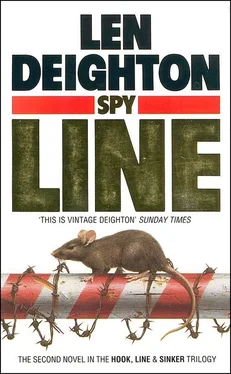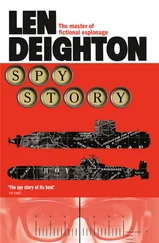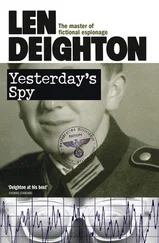Len Deighton - Spy Line
Здесь есть возможность читать онлайн «Len Deighton - Spy Line» — ознакомительный отрывок электронной книги совершенно бесплатно, а после прочтения отрывка купить полную версию. В некоторых случаях можно слушать аудио, скачать через торрент в формате fb2 и присутствует краткое содержание. Жанр: Триллер, на английском языке. Описание произведения, (предисловие) а так же отзывы посетителей доступны на портале библиотеки ЛибКат.
- Название:Spy Line
- Автор:
- Жанр:
- Год:неизвестен
- ISBN:нет данных
- Рейтинг книги:4 / 5. Голосов: 1
-
Избранное:Добавить в избранное
- Отзывы:
-
Ваша оценка:
- 80
- 1
- 2
- 3
- 4
- 5
Spy Line: краткое содержание, описание и аннотация
Предлагаем к чтению аннотацию, описание, краткое содержание или предисловие (зависит от того, что написал сам автор книги «Spy Line»). Если вы не нашли необходимую информацию о книге — напишите в комментариях, мы постараемся отыскать её.
Spy Line — читать онлайн ознакомительный отрывок
Ниже представлен текст книги, разбитый по страницам. Система сохранения места последней прочитанной страницы, позволяет с удобством читать онлайн бесплатно книгу «Spy Line», без необходимости каждый раз заново искать на чём Вы остановились. Поставьте закладку, и сможете в любой момент перейти на страницу, на которой закончили чтение.
Интервал:
Закладка:
10
The region of Czechoslovakia that borders Austria 's northern frontier is Moravia. Somewhat surprisingly, it is a short drive from downtown Vienna. Or would have been, had we not run into the Haydn Festival. Once at the border we'd passed through the Austrian controls with no more than a moment's pause while Staiger waved his papers at them. But the Czechoslovak checkpoint was a different matter entirely.
It was a busy place, for it lies on the direct route from Vienna to Prague, and beyond that Berlin. Here, through the gap between Alps and Carpathians, the wind from the Russian steppe brings sudden drops in temperature and bites through even the warmest of clothes to chill the bones. As well as the cars, on this day about twenty or so articulated heavy trucks from all corners of Europe were lined up nose to tail. Inside their vehicles, windows tightly closed, the drivers dozed, chatted and read, patiently waiting their turn in the large grey-painted hut where the cargo manifests and vehicle documentation were slowly read, incessantly queried and reluctantly rubber-stamped by uniformed bureaucrats, beady-eyed men with inky fingers and regularly oiled guns.
Baron Staiger, aka Otto Hoffmann, this morning wearing a wavy brunette toupee, had collected me from the Vienna hotel where I'd spent the night after leaving his home. We were in a white jeep-like Subaru, and somewhat conspicuous amongst the exotic collection of Eastern bloc vehicles. There were mud-spattered Ladas, smelly two-stroke Wartburgs, a Skoda cabriolet repainted bright pink, and a wonderful old Tatraplan with a long fin marking the air ducts of the rear engine compartment. With imperious disregard of the other drivers Staiger drove to the head of the line and parked carelessly alongside the glass-sided box from which half a dozen Czech officials surveyed the landscape with impassive disdain.
Staiger said, 'Wait in the car,' and went over to engage the sentry in animated talk while tapping the pink identity cards. Whatever dialect the sentry spoke Staiger seemed to speak it too, for the response was warm and immediate. The sentry nodded at Staiger and looked up and waved in the direction of a large green car on the Czech side of the border. Two men in civilian clothes hurried over to Staiger. They were tall, bulky men in trenchcoats, the sort of men who want everyone to know they work for the 'First Section' of the STB: that most effective of all the East European secret police services which – significantly perhaps – chose an ancient Prague monastery as its headquarters. The barrier was immediately raised.
'All okay,' said Staiger as he climbed back into the driver's seat bringing with him a breath of chill winter air.
'All okay,' I echoed. 'Well, that's a nice change.'
'What?'
'All that tomfoolery with the stamp auction… and at the end it went wrong.'
'It's a regular route for our documents,' he said smugly. The Prague office arranged it; usually it goes like clockwork.'
'Maybe someone should tell them that we live in the age of quartz crystals,' I said.
'The Americans were bidding against us. They got wind of what was happening. The Vienna CIA office sent a man with a pocketful of money.'
'And that's not the way we work,' I said bitterly, remembering my inadequate allotment of schillings.
'No one can outbid the Americans,' he said. 'It was lucky that I could fix it.'
The green car was on the road ahead of us as we went through the crossing point and through the frontier zone where trees and bushes have been cleared and mines sowed.
'They'll stay with us.'
'Will they?' I said and tried to sound pleased.
We followed them into the Moravian countryside. Eventually their green car turned off the main Prague road. The track was poorly maintained and to keep behind them Staiger had to engage the four-wheel drive.
This is a strange and baleful landscape: a sinister legacy of history. Until a generation ago some of these border regions were as prosperous as any in the whole land. Since the time of the Empire, German-speaking people lived in these lovely little towns with tree-lined thoroughfares and baroque houses set around grand squares.
But Adolf Hitler used the Volksdeutsche as an excuse to add these border lands to his Third Reich. This was the 'far-away country' that Britain's Prime Minister – having contrived the modern world's first summit meeting – would not go to war for. This was where 'appeasement' got a new pejorative meaning and ' Munich ' became a way of saying surrender. Here lived the Czechs who waved swastika flags and welcomed the German invaders in their own language.
But after Hitler was defeated, the Stalinist government in Prague ruthlessly pushed the three and a half million German-speaking Czechs out of the country. Given only a few hours' notice the exiles were permitted to take only what they could carry. They hiked across the border to find a new homeland. The vacated homes were ransacked by authorized officials and looters too. In a gesture more political than practical the houses were eventually turned over to vagrants and gypsies. Now few of even those residents remain.
We drove through villages that reflected the ambivalence the authorities showed towards this old 'German region'. Stop and go; push and pull; here were the fits and starts of a ponderous socialist bureaucracy burdened by its own historical perspective. Old buildings were half demolished and new ones half built. Piles of rubble spewed out into the roadway and abandoned cinder-block frameworks waited for roofs and windows that would never come.
We bumped through a little ghost town, disturbing a slumbering pack of gaunt dogs that slipped away without even barking. There were no people anywhere. The houses on the main square – their regal 'Maria Theresa yellow' stucco faded into a pox of chalky scars – were boarded up. So were the shops.
I pushed at the heating control again. 'For the last time, Staiger. When are you going to tell me what this is all about?' In London I had been told to do whatever he said. I was doing so but I did not enjoy being kept in the dark.
He shifted in the driver's seat as if his spine was becoming stiff. 'I cannot do that,' he said affably, as he'd said it so many times before on this endless and uncomfortable journey. 'My orders are to take you to the place we have to visit: nothing else.'
'And bring me back?'
He smiled. 'Yes. Bring you back too. At four o'clock. That's all I know.'
Until now the few bits of conversation we'd exchanged had been only Viennese gossip, mostly concerning people I knew only slightly or not at all. Even worse, I'd heard Staiger's detailed observations on Vienna 's confectionery, in particular its Torten . He'd explained exactly why he preferred the single-layer simplicity of the Linzertorte to everything else at Sacher. He revealed every last secret of Demel's delicate Haselnusstorte and told me which of their vast selection of Torten benefited from the addition of a portion of whipped cream, and which would be spoiled by such a garnish. He even gave me the address of a little café where the extraordinary quality of the apricot filling they put in their Saehertarte made it preferable to the one they served at Sacher's.
'What do I have to do at this meeting? Did they tell you that in your orders?'
He wrenched his mind away from the cakes. 'They said you would know.'
'Is it a Russian?'
'I say I don't know. This is the truth; I don't know. Soon we will be there.' He was disappointed that his thesis on pastries had been so coolly received. Perhaps at some other time I would have enjoyed his dissertation, even joined him for a Kaffeeklatsch tour of the city. But not today.
The clouds were dark and in the dull light the distant mountains loomed unnaturally large. Everything was grey: the sky was grey, the mountains were grey, the farm buildings were grey: even the snow was grey. It was like a poorly printed snapshot: no black nor white anywhere. Life in Eastern Europe was like that nowadays. Belief had gone. Communism had faded but capitalism had not arrived: everyone muddled along, complying but not believing.
Читать дальшеИнтервал:
Закладка:
Похожие книги на «Spy Line»
Представляем Вашему вниманию похожие книги на «Spy Line» списком для выбора. Мы отобрали схожую по названию и смыслу литературу в надежде предоставить читателям больше вариантов отыскать новые, интересные, ещё непрочитанные произведения.
Обсуждение, отзывы о книге «Spy Line» и просто собственные мнения читателей. Оставьте ваши комментарии, напишите, что Вы думаете о произведении, его смысле или главных героях. Укажите что конкретно понравилось, а что нет, и почему Вы так считаете.












